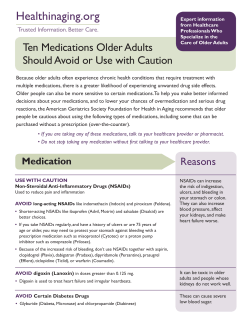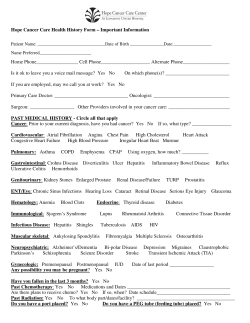
Zyprexa (olanzapine)
Zyprexa (olanzapine) FDA ALERT [04/2005] Zyprexa is a type of medicine called an atypical antipsychotic. FDA has found that older patients treated with atypical antipsychotics for dementia had a higher chance for death than patients who did not take the medicine. This is not an approved use. Brand/Generic Names: • Brand Name: Zyprexa® Tablets: 2.5 mg, 5 mg, 7.5 mg, 10 mg, 15 mg, 20 mg Rapidly disintegrating tablets (Zyprexa Zydis®): 5 mg, 10 mg, 15 mg, 20 mg Intramuscular: 10 mg vials for intramuscular injection • Generic name: olanzapine What is Zyprexa® and what does it treat? Olanzapine (Zyprexa®) is an antipsychotic medication approved to treat schizophrenia, and acute mania or mixed episodes of bipolar disorder. Olanzapine can improve symptoms of schizophrenia such as: hallucinations, delusions, and disorganized thinking; in some people, improvement in social isolation, reduced speech productivity and motivation. Olanzapine can improve symptoms of mania which include: racing thoughts, having an inflated sense of importance, an elevated mood, being impulsive, being irritable as well as a decreased need for sleep. Olanzapine has also been approved for the treatment of agitation associated with schizophrenia or bipolar I mania. Page 1 of 7 What is the most important information I should know about Zyprexa®? Relapse is very common in schizophrenia and bipolar disorder and the most frequent cause is that individuals stop taking their medication. Even when medication is taken exactly as prescribed, relapse may still occur for some people. Therefore, it is recommended that you take your medication exactly as prescribed by your healthcare provider as this has been shown to delay relapse. Schizophrenia and bipolar disorder require long-term treatment. Only your healthcare provider can determine the length of olanzapine treatment that is right for you. Olanzapine is an atypical antipsychotic, these medications have been given warnings by the FDA for the possibility that the following adverse effects may occur: diabetes, severe hyperglycemia, increases in blood cholesterol and/or triglycerides. When taking olanzapine consider nutritional and exercise lifestyle changes to reduce this risk. Do not stop taking olanzapine or change your dose without talking to your healthcare provider first. Some people may develop side effects on olanzapine such as extrapyramidal effects (restlessness, tremor, stiffness) or tardive dyskinesia (slow or jerky movements that one cannot control). These symptoms are likely to be less severe and occur less often than with the older antipsychotic medications (e.g.,: Haldol® [haloperidol], Prolixin® [fluphenazine], Thorazine® [chlorpromazine]). If you develop movements that you cannot control, call your healthcare provider immediately. Olanzapine treatment may be associated with strokes and/or transient ischemic attacks (TIAs) in elderly people with dementia and accompanying behavior problems. This safety concern has not been proven confidently, but there is some evidence. Talk with your health care provider if you are concerned or have questions. Olanzapine treatment must be monitored by a healthcare provider. Be sure to keep all of your scheduled appointments so that you stay healthy while on olanzapine. You should not take illegal drugs or drink alcohol while taking olanzapine. Smoking can affect the amount of olanzapine that gets into the body. Tell your healthcare provider if you smoke. Treatment with olanzapine is usually well tolerated. However, common adverse effects include: daytime sleepiness, dizziness, increased appetite, weight gain, and restlessness. What should I discuss with my healthcare provide before taking Zyprexa®? • Symptoms of schizophrenia or bipolar disorder which are most bothersome to you. Page 2 of 7 • The medications you have taken in the past for schizophrenia or bipolar disorder. It would be helpful for your provider to know which medications were effective and which were not. • Which side effects from previous medications were too uncomfortable for you to tolerate. • About any medication allergies you have. • All other prescription and non-prescription medications you are currently taking. • If you smoke cigarettes or plan to quit smoking, use illegal drugs, or drink alcohol. • If you are pregnant, plan to get pregnant, or are breast feeding. • If you or any family members have had breast cancer • What medical problems you have, especially diabetes, high cholesterol or triglycerides, increased body weight, irregular heart beats, or seizures. • If you have had any serious extrapyramidal symptoms “EPS” from other medications; such as (restlessness, tremor, stiffness) or tardive dyskinesia (slow or jerky movements that one cannot control). • Tell your doctor if you have thoughts of suicide. • If you have had neuroleptic malignant syndrome “NMS”. Neuroleptic malignant syndrome “NMS” is a life-threatening, neurological disorder most often caused by an adverse reaction to antipsychotic medications. Symptoms of “NMS” include sudden high fever, sweating, changing blood pressure, dizziness, fatigue, muscle stiffness, as well as changes in liver & kidney function. In most cases, the disorder develops within the first 2 weeks of medication treatment; however, the disorder may develop any time during the course of pharmacotherapy. Early identification of and treatment for individuals with neuroleptic malignant syndrome slows the progression and improves recovery from “NMS”. Sometimes a different antipsychotic can be reintroduced very slowly once recovery is complete, although there is a risk that the syndrome might recur. Generally, intensive care is needed to treat and appropriately diagnose neuroleptic malignant syndrome “NMS”, so notify your healthcare provider immediately if you suspect you are developing “NMS”. How should I take Zyprexa®? • Olanzapine is usually taken once daily. Most patients begin at a low dose and it is increased slowly over several weeks. Some patients are prescribed multiple daily doses as determined by their health care provider. • • Olanzapine can be taken with or without food. Use a calendar or pill box to help you remember to take your medication. Or, have a family member or friend remind you or check in with you to be sure you are taking your medication. Page 3 of 7 • The usual maximum recommended dose of olanzapine (Zyprexa®) is 20 mg a day. The dose that is right for you will be determined by your healthcare provider. What happens if I miss a dose? If a dose of olanzapine is missed, take it as soon as you remember it, as long as if it is not too close to when your next dose is due. Please discuss this possibility with your health care provider. Do not double your next dose or take more than what is prescribed. What should I avoid while taking Zyprexa®? • Avoid using illegal drugs or drinking alcohol. • • Any over-the-counter “OTC” medication especially those that can cause excessive sleepiness or excitement such as cough and cold remedies. Any herbal or natural supplement. • Avoid overexposure to the sun. Use sunscreen with at least SPF 15 and wear light colored clothing with a hat to protect your head and face. • Some people get drowsy on olanzapine. Avoid driving a car or other motor vehicles until you are certain how the medication affects you. What happens if I overdose? Call your doctor or emergency medical service (911). If an overdose occurs, whether intentional or accidental, immediate medical attention is necessary. Signs and symptoms of olanzapine overdose may include the following: slurred speech, drowsiness, low blood pressure, runny nose, coma, racing heartbeat, lockjaw or grinding of your teeth, small pupils, muscle twitching or shaking, slowed breathing, changes in balance and walking, and/or unusual movements. If you think you or someone you know has overdosed on olanzapine, FIRST call 911 immediately and try to keep the person awake and maintain telephone contact with 911 until medical attention arrives. What are the possible side effects of Zyprexa®? Olanzapine’s more common side effects are usually relatively minor, especially when taken at doses of 15 mg/day or less. Some people may experience low blood pressure or dizziness, especially when standing up suddenly. Heart palpitations, sleepiness; dry mouth; constipation; weight gain; sexual dysfunction; and fatigue are also possible. These side effects may also include extrapyramidal symptoms “EPS” (muscle stiffness, tremors, and body shakes). Some of these problems may be reduced or eliminated by increasing the dose slowly. At higher doses, extrapyramidal side effects often increase. Cogentin® (benztropine) or Page 4 of 7 Benadryl® (diphenhydramine) can be prescribed to reduce or eliminate stiffness as well as tremors. Patients who already have low blood pressure, have kidney or liver impairment, are elderly, or are in a weakened condition may require close monitoring and even more gradual dose adjustment. The concurrent use of benzodiazepines like (diazepam) Valium® or (lorazepam) Ativan® with olanzapine may lead to very low blood pressure or dizziness upon arising. Zyprexa® may also cause more serious side effects such as increases in glucose, cholesterol, or triglyceride blood levels. The FDA has had all makers of atypical antipsychotics include warnings to prescribers and consumers, that these medications may place individuals at risk for developing diabetes. If you get high blood glucose you may feel very tired, have to go to the bathroom often, and have blurry vision. Also, you might be very thirsty and feel sick to your stomach. If you have any of these symptoms please talk to your health care provider as soon as possible. In some clinical trials, it was determined that elderly people treated with olanzapine developed strokes at a higher rate than those on placebo medication (sugar pill). It is not known at this time if olanzapine causes stroke. Are there any risks for taking this medication for long periods of time? Tardive dyskinesia “TD” is a side that may develop with prolonged use of antipsychotics. Medications such as olanzapine have been shown to have a much lower risk of TD compared to older antipsychotics, such as Haldol (haloperidol). Should you develop symptoms of TD, such as grimacing, sucking and smacking of lips, and other movements that you cannot control, contact your healthcare provider immediately. Zyprexa® is thought to have a higher risk of weight gain than some of the other atypical antipsychotics. No one can predict how much weight a person will gain on any medicine. However a comprehensive treatment approach with an “atypical” antipsychotic such as olanzapine would also include exercise, diet and monitoring for weight gain as well as diabetes. What other drugs interact with this medication? Some antidepressants such as fluoxetine (Prozac®) and fluvoxamine (Luvox®),may increase the blood levels of olanzapine. Some anti-infective medications may alsoincrease the blood levels of olanzapine. These medications include atazanivir(Reyataz®), ciprofloxacin (Cipro®), erythromycin (Ery-Tab®) and isoniazid (“INH”). It is possible that patients taking olanzapine with any of these medications may experience a change in side effects. Please tell your healthcare provider if you begin or discontinue any of these treatments. Anti-viral and anti-infective medications, such as darunavir/ritonavir (Prezista®), lopinavir/ritonavir (Kaletra®), rifampin (Rifadin®), and ritonavir (Norvir®) may decrease the blood levels of olanzapine. In addition anticonvulsants and other Page 5 of 7 medications may also decrease olanzapine blood levels including: carbamazepine (Tegretol®), phenobarbital, phenytoin (Dilantin®), St. John’s Wort and omeprazole (Prilosec®). It is possible that you may experience a decreased effect from olanzapine if you also take one of these medications. Please tell your healthcare provider if you begin or discontinue any of these treatments. Additional medications, such as metoclopramide (Reglan®), levodopa (Dopar®), methyldopa (Aldomet®), pergolide (Permax®) may keep olanzapine from working in your body. It is possible that you may experience a decreased effect from olanzapine if you also take one of these medications. Please tell your healthcare provider if you begin or discontinue any of these treatments. Cigarette smoking can affect the amount of olanzapine that gets into the body. If you smoke or plan on smoking, have, or will attempt to quit smoking please tell your healthcare provider. How long does it take for Zyprexa® to work? Zyprexa®, rebalances dopamine and serotonin to improve thinking, mood, and behavior. Improvement of some symptoms may be noticed in some patients within a few weeks. The full benefit of olanzapine may not be seen for 6-12 weeks or longer. Updated by Kara Lee Shirley, Pharm.D., BCPP (December 2006) NAMI wishes to thank the College of Psychiatric and Neurological Pharmacists for producing this fact sheet. For further information please contact the pharmaceutical company listed below. Eli Lilly and Company Lilly Corporate Center Page 6 of 7 Indianapolis, IN 46285 800-545-5979 www.lilly.com Free or low-cost medications provided by pharmaceutical companies Some pharmaceutical companies offer medication assistance programs to low-income individuals and families. These programs typically require a doctor’s consent and proof of financial status. They may also require that you have either no health insurance, or no prescription drug benefit through your health insurance. Please contact the pharmaceutical company directly for specific eligibility requirements and application information. Zyprexa Rx Assistance Program: 1-800-545-6962 Page 7 of 7
© Copyright 2025

















